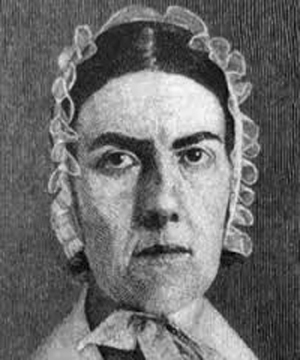Angelina Emily Grimké was born on February 20, 1805. She was the fourteenth and last child of Mary Smith Grimké and John Faucheraud Grimké. Three of their children died in infancy. Mary Smith Grimké’s wealthy South Carolina family included two governors during colonial times.
John Grimké, descended from German and Huguenot settlers, had been a Continental Army captain during the Revolutionary War. He served in the state House of Representatives and as the state’s chief justice. Sarah, the sixth of the 14 children, had been taught the usual subjects for girls, including reading and embroidery.
she also studied with her brothers. When her older brother Thomas went to Harvard, Sarah realized that she could not hope for an equal educational opportunity. At age 5, she begged a sea captain to help a slave escape, after she saw the slave shipped.
Angelina was able to attend a seminary for girls. There, she fainted one day when she saw a slave boy her own age opening a window, and noticed he could barely walk and was covered on his legs and back with bleeding wounds from a whipping. Sarah tried to console and comfort her, but Angelina was marked by this. At age 13, Angelina refused confirmation in the Anglican Church of her family because of the church’s support for slavery.
In 1819, Angelina moved to Philadelphia, along with her sister. She joined the religious group ‘Society of Friends’, in a bid to stand up against slavery and discrimination. Angelina embraced ‘Presbyterian’, a Christian group which was a bit unorthodox in its approach, when she was just 21 years old. Gremke started preaching religious values to the workers at her family home, who were considered slaves. This move made her mother furious initially, but later Angelina’s effort was appreciated.

The ‘American Anti-Slavery Committee’ held a two week conference to emphasize the importance of anti-slavery rights, in 1836. Angelina, and her sister Sarah Moore, attended the event. Soon, the duo was invited to address many gatherings, in a bid to end slavery.
Sarah and Angelina also paved way for several anti-slavery groups in the New York region. One of the most noted moves of Angelina against slavery was the three appearances she made before the legislative committee of Massachusetts. This made her the first woman in the history of America to appear before a legislative body.
Angelina married fellow abolitionist Theodore Weld in 1838, the same young man who had helped prepare the sisters for their speaking tour. The marriage ceremony included friends and fellow activists both white and black. Six former slaves of the Grimké family attended.
Weld was a Presbyterian, the ceremony was not a Quaker one, Garrison read the vows, and Theodore renounced all legal power that laws at the time gave him over Angelina’s property. They left “obey” out of the vows. Because the wedding was not a Quaker wedding and her husband not a Quaker, Angelina was expelled from the Quaker meeting. Sarah was also expelled, for attending the wedding.
Sarah died in Boston in 1873. Angelina suffered strokes shortly after Sarah’s death, and was paralyzed. Angelina Grimké Weld died in Boston in 1879. Theodore Weld died in 1885.